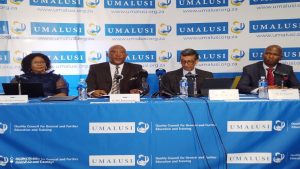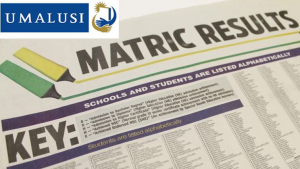Education regulatory body, Umalusi has asked the assessment bodies carrying out matric exams to make alternative arrangements for the supply of power during the writing of the year-end examinations to mitigate the risk of load-shedding.
Every year the regulatory body is tasked with the mission to evaluate whether public and private schools are ready to handle the large number of pupils expected to write their final matric papers. Part of their job is to determine through assessments whether the Basic Education Department (DBE), the Independent Examinations Board(IEB), and the South African Comprehensive Assessment Institute (SACAI are all set with enough resources to ensure free and fair examinations.
While addressing the media, Umalusi CEO, Dr. Mafu Ramoketsi, said that their organisation is worried about disruptions that can be caused by load shedding and the lack of sustainable back-up systems at examination centres during the writing of the examinations, especially in connection with subjects with a practical component, namely Computer Applications Technology (CAT), Information Technology (IT), and South African Sign Language Home Language (SASL HL).
“The request that we have made to the department is that they should bring to the attention of Eskom the dates when these subjects will be written – IT + CAT and Eskom should be requested to ensure that there is no load shedding at that time. However, should it happen that there’s load shedding we’ve got a Plan B, where can organise a re-write. We are not in full control of the situation, we can only appeal to Eskom, the schools, and the districts to improvise.”
Other shortcomings identified ahead of the exams include a shortage of examination staff, storage points that are not compliant with their standards – especially in Limpopo – and a shortage of markers in some subjects in Mpumalanga and KwaZulu-Natal.
Umalusi’s senior manager for quality assurance of assessment, Mary-Louise Madalane, said some of these identified shortcomings are not of such a magnitude that they have the potential to put the credibility of the examinations at risk. “Umalusi appreciates the effort made by all assessment bodies in putting systems in place to ensure that the integrity of the 2022 national examinations is not compromised.”
Overall the institution says they are satisfied that the DBE, IEB, and SACAI, are ready to conduct the November 2022 NSC examinations.
Almost a million learners will seat for the end-year National Senior Certificate examinations.
Below is the breakdown of the numbers:
Candidate Enrolled for the National Senior Certificate (NSC)
Assessment Body Full-Time Part-Time Total
DBE 755 981 167 479 923,460
IEB 12 599 968 13,567
SACAI – 4 951 4,951
Both public and independent schools are expected to begin their exams later this month.
With IEB, starting on the 19th of October and concluding their exams on 29 November 2022.
Both DBE and SACAI will start on the 31st of October and conclude on the 6th of December 2022.
In the end, Dr. Rakometsi, issued a firm warning to all the stakeholders: “we would like to issue a stern warning to all learners and teachers to refrain from all forms of cheating, including group copying where teachers are sometimes implicated.
He added “ We berate and condemn this criminal practice with the contempt it deserves. Cheating compromises the integrity of our national examination system, which we are mandated to jealously protect as a Quality Council.”






